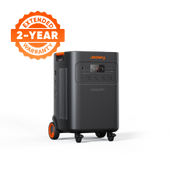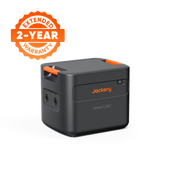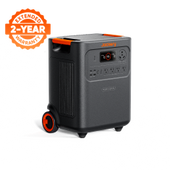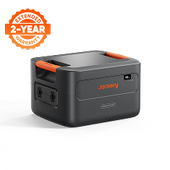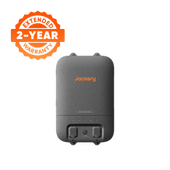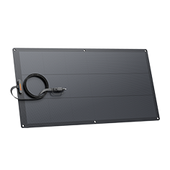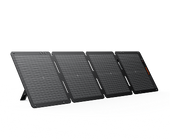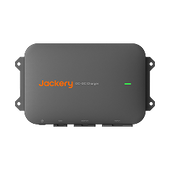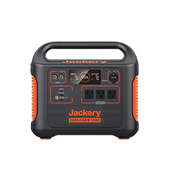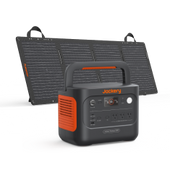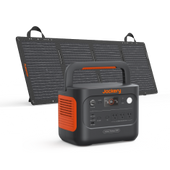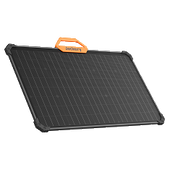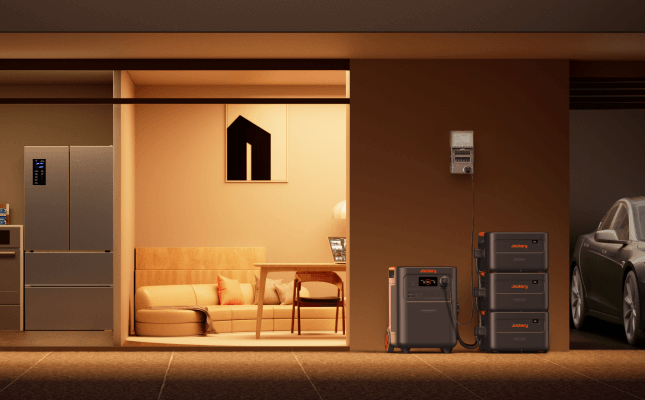In order to run a refrigerator, you typically need a solar generator with at least 1,000 to 2,000W. Most household refrigerators use 300 - 800 running watts, but their starting surge can be 2 - 3 times higher, so choosing a generator in this range ensures smooth and reliable operation.
Refrigerators are one of the essential home appliances and it can be a major hassle to charge them during a power outage. That's where the best solar generator for refrigerators comes into the picture. However, before you plan to invest in the charging solution, you need to understand what size generator is needed to run a refrigerator and freezer.
Jackery Solar Generators are available in different sizes to keep essential appliances like refrigerators and freezers running during power outages or outdoor adventures. These are powerful, portable, and lightweight home battery backup solutions that can power various appliances, such as mini freezers, air coolers, electric grills, etc., whenever required.
AI Takeaways
- Most refrigerators use 300 - 800 running watts, but require 1,200 - 2,400 surge watts when starting.
- A 1,000 - 2,000-watt generator is generally enough to run a standard home refrigerator safely.
- You should always check your refrigerator’s EnergyGuide label or user manual to find its exact running and surge wattage.
- If you plan to power other appliances alongside the fridge, you should consider choosing a larger generator (2,000 - 3,000 watts or more) to avoid overload.
- What size solar generator is needed to run a refrigerator.
How Many Watts Does A Refrigerator Use?
On average, a refrigerator uses between 300W and 800W. As there are different variants of refrigerators available on the market, the wattage required to run a fridge varies considerably. For example, a small refrigerator, mini solar cooler, or compact freezer uses fewer watts, whereas a large refrigerator needs more power.
Read on to find out how much solar energy you need to run a refrigerator, the starting and running watts, and the different refrigerator types available on the market.
What Is Watt?
Watt (or W) is a unit of power used to quantify the energy transfer rate for a moment at a time. On the other hand, watt-hour (Wh) measures energy for a specific period. For instance, energy spent in one hour is termed a watt-hour.
How Many Starting & Running Watts Refrigerator Use?
A typical household refrigerator uses 300 - 800 starting watts and 100 - 250 running watts. The actual wattage consumption of a refrigerator or fridge will significantly depend on size, age, and energy efficiency. Smaller, mini-fridges use considerably less, while older, less efficient models and larger units like side-by-side refrigerators require more power.
This is because large appliances like freezers and refrigerators have electric motors present in them. That's why they need more starting watts than running watts. The starting watt is the power required to start an appliance; meanwhile, the running watt is the power any device needs to run for hours.
Generally, starting watts are usually two to three times greater than running watts. Here is the simple formula to calculate starting watts.
Starting watts = 2 or 3 * Running watts
Let us assume that a refrigerator consumes 300 running watts. Here is how you can calculate the starting watts:
Starting watts = 2 or 3 * 300W = 600 - 900W.
Here, 600 - 900 watts is the minimum starting power you need to run the refrigerator. That said, you'll need to purchase a 1000-watt generator to safely run the refrigerator.
Pro Tip: Before buying the best solar-powered generator for a refrigerator, it's vital to check the battery capacity, brand, and manufacturer. There are different solar power generators available in the market. Also, check the power station's features and ensure they have a robust protection system to keep the large appliance like refrigerator safe.

How Much Energy is Needed To Run A Refrigerator?
When you run a refrigerator (300W) for 8 hours a day, the energy consumption will be 2,400Wh. If you use a mini fridge (150W) for 8 hours a day, the energy consumption will be 1,200Wh.
One of the common questions homeowners ask while buying solar generators is: how much solar power do I need to run a refrigerator. The short answer lies in the type of refrigerator you have.
For instance, if you have a large refrigerator that consumes around 800W, you'll have to purchase a solar generator with a high capacity. A solar generator that can provide 800Wh (watt-hour) or more would be suitable for powering large refrigerators.
Meanwhile, if you want to power a mini cooler for camping or other outdoor activities, consider purchasing a solar generator with a power output of 1000 watts. With a 1000 W solar generator, you can power different appliances with clean and green energy.
Here are a few different types of refrigerators with their starting and running watts.
- Large home refrigerators require 200-400 running watts and 600-1200 starting watts. This refrigerator is usually present in homes and businesses.
- Average home refrigerators require 100-250 running watts and 300-750 starting watts.
- Small home refrigerators require 75-150 running watts, whereas starting watts are 225-450. An average solar power generator can keep your small power generator charged for long hours.
- Mini coolers or fridges require 50-100 running watts and 150-300 starting watts. The portable refrigerator and solar generator combo will help keep your food cool and healthy.
- Compact home or RV refrigerators require only 40-50 running watts, with starting watts around 120-150. These refrigerators are portable and perfect for camping and outdoor activities.
Another question that solar generator buyers ask is: how many solar panels to run a refrigerator or freezer? The answer to this depends on your requirements and the wattage your electrical appliance consumes in one hour.
On average, the refrigerator takes around one to four solar panels to run. However, it will directly depend on the panel's solar generation capacity and the refrigerator's size. You can choose the number of solar panels depending on the power generator size and the estimated daily energy consumption.
Here is the breakdown of how many watts different refrigerator types consume or the energy that runs a refrigerator. Understanding the power consumption of a refrigerator will help you determine how many watt generators are needed to run a refrigerator.
|
Refrigerator Types |
Estimated Watt |
Length of Time Powered each day |
Estimated daily energy consumption (Watt-hours) |
Estimated monthly energy consumption (Watt-hours) |
Estimated yearly energy consumption (Watt-hours) |
|
Mini Cooler |
50-100 Watt |
8H |
400-800 Wh |
12000-24000 Wh |
144000-288000 Wh |
|
Single Door Large Refrigerator |
100-200 Watt |
5H |
500-1000 Wh |
15000-30000 Wh |
180000-360000 Wh |
|
Double Door Large Refrigerator |
350-780 Watt |
3H |
1050-2340 Wh |
31500-70200 Wh |
378000-842400 Wh |
|
Single Door Small Refrigerator |
75-150 Watt |
6 H |
450-900 Wh |
13500-27000 Wh |
162000 -324000 Wh |
|
Double Door Small Refrigerator |
200-350 Watt |
4 H |
800-1400 Wh |
24000-42000 Wh |
288000-504000 Wh |
|
Triple Door Refrigerator |
300-600 Watt |
8 H |
2400-4800 Wh |
72000-144000 Wh |
864000-1728000 Wh |
|
Compact Refrigerator |
40-50 Watt |
6 H |
240-300 Wh |
7200-9000 Wh |
86400-10800 Wh |
Best Solar Generators For Refrigerator
Jackery is a leading solar brand manufacturing solar generators, portable power stations, and solar panels. The Jackery Portable Power Stations can be recharged with the Jackery SolarSaga Solar Panels, wall outlets, and a car charger. Jackery can power refrigerators and freezers of different sizes and capacities.
The Jackery Solar Generators are available in various capacities. Depending on the running and starting watts of refrigerators, you can choose the right size of solar generator. For example, you can choose a small solar generator if you want to charge a small freezer. On the other hand, a large solar generator would be ideal for extended power outages.
Jackery Solar Generator 5000 Plus
If you want an essential home backup solution that can power most critical household appliances during short or long power outages, then the Jackery Solar Generator 5000 Plus would be an ideal choice. It can power various types of refrigerators for long hours or even days, ensuring your food does not spoil during unexpected power cuts. You can also power other home appliances, such as ice makers, coolers, washing machines, etc., that run at 120V or 240V. It also features double wheels and a pull rod, so you can easily drag the solar generator wherever you go.
Appliances Running Time
- Compact Refrigerator (50W) = 42.8H
- Car Fridge (60W) = 38.9H
- Mini Fridge (100W) = 28.6H
- Small Home Refrigerator (150W) = 21.4H
- Large Home Refrigerator (400W) = 9.5H
Who Should Buy This
If you want to keep your refrigerator and other essential appliances running during long-term power outages, you can consider going ahead with the Jackery Solar Generator 5000 Plus. It has a massive battery capacity and can even be extended up to 60kWh with add-on battery packs.

Customer Review
“Love it!! Very maneuverable! Lots of power! Will work perfectly for keeping our fridge and freezer going and more! So glad to have peace of mind.” — Tammy Shoemaker.
Jackery Solar Generator HomePower 3600 Plus
The Jackery HomePower 3600 Plus is especially useful if keeping your refrigerator running is your top priority during outages. With its high-capacity output and expandable battery options, it can power a fridge for up to 14 days to ensure your food, medicine, and other perishables stay safe. This makes it an excellent safeguard against spoilage, giving you one less thing to worry about when the power goes out. If your main concern is keeping your fridge reliably powered without the noise or fumes of a gas generator, the Jackery Solar Generator HomePower 3600 Plus is a dependable solution.
Appliances Running Time
- Compact Refrigerator (50W) = 42.3H
- Car Fridge (60W) = 37.2H
- Mini Fridge (100W) = 25.0H
- Small Home Refrigerator (150W) = 17.7H
- Large Home Refrigerator (400W) = 7.2H
Who Should Buy This
The Jackery Solar Generator HomePower 3600 Plus is an essential home backup solution ideal for families who want to protect their groceries during extended blackouts, people storing temperature-sensitive medicines at home, or anyone living in areas where outages are frequent and long-lasting.

Customer Review
“This is such a reliable product. This is our 3rd Jackery. Not because they stopped working, but because we just want more of them. For any off grid living this should be your go to product.” — Dominique Cipriani.
Jackery Solar Generator HomePower 3000
The Jackery Solar Generator HomePower 3000 is an essential home backup solution that can supply steady power to household or outdoor appliances for long hours. If you live in an area that faces unexpected long-term power outages, you may consider this home battery backup for refrigerators. It can run small, midsize, and large refrigerators for long hours, ensuring your food does not get spoiled. It also features dual-sided handles that ensure easy movement wherever you go.
Appliances Running Time
- Compact Refrigerator (50W) = 36.3H
- Car Fridge (60W) = 31.8H
- Mini Fridge (100W) = 21.4H
- Small Home Refrigerator (150W) = 15.2H
- Large Home Refrigerator (400W) = 6.2H
Who Should Buy This
The Jackery Solar Generator HomePower 3000 is an easy home backup solution for homeowners looking to keep their fridge powered for up to two days.

Customer Review
“This Jackery HomePower 3000 is a game-changer and a breath of fresh air for me. I drive a Chevy Silverado, so there’s plenty of room for this thing in the back. The Jackery HomePower 3000 powers EVERYTHING I need (and then some) as a nomadic traveler.” — Trin B.
What Size Of Generator to Run Refrigerator and Freezer?
A 2000-watt or 3000-watt generator can safely run both a refrigerator and a freezer reliably.
If you want to power both a refrigerator and a freezer, you will need to account for the running watts of each appliance as well as their starting surges. On average, a refrigerator uses 300 - 800 running watts, while a standalone freezer typically requires 400 - 1,000 running watts. When these appliances cycle on, they can draw 2 - 3 times more power for a few seconds, which means your generator must be able to handle those spikes.
To be on the safe side, a solar generator with at least 2,000 to 3,000 watts of capacity is recommended. This solar generator range gives you enough room to cover both appliances running together, plus their combined startup surge. If your refrigerator and freezer are larger models or if you plan to power additional small devices at the same time, it’s smart to size up to avoid overload.

Conclusion
If you're planning to use clean and renewable energy for your home, a solar generator for the refrigerator is all you need. Besides the fridge, you can power other appliances, including a coffee maker, mini cooler, electric grills, and electric blanket, to name a few.
Purchasing a solar generator for refrigerator is all you need to go solar and cut connections from your electricity grid.
Instead of purchasing a solar-powered refrigerator, you can buy a solar generator to power your traditional freezer. Jackery Solar Generator HomePower 3000, Jackery Solar Generator HomePower 3600 Plus, and Jackery Solar Generator 5000 Plus are essential home backup solutions that can power most of your appliances at home.
They are portable solutions that help you power your appliances while away from home. If you want more exciting news about Jackery products, subscribe to our newsletter and get every information about deals and offers in your inbox.
FAQs About Solar Generator For Refrigerator
1. Can a 100-watt solar panel run a refrigerator?
No, a 100-watt solar panel cannot run a refrigerator due to insufficient daily energy production and the high energy needs of a refrigerator. A single 100-watt solar panel can efficiently run several small devices, including phones, laptops, fans, lamps, etc. However, you'll need to purchase a solar power station to pair with the panels and charge appliances like refrigerators, CPAP and so on.
2. How many solar panels to run a refrigerator?
You generally need 3 to 4 high-wattage solar panels (300W or more) and a battery backup to run a standard household refrigerator. The expected number of solar panels to run a refrigerator will depend on several factors, including:
- The power rating of the solar panels
- The capacity of the solar power generator
- Amount of peak sunlight hours you receive
- Energy consumption or wattage requirements of your refrigerator
Remember, solar panels won't work independently, and you must connect them to portable solar power generators. The right combination will help you power all your appliances, including the refrigerator, and prevent the items from degradation.
3. How long will a solar generator power a refrigerator?
A solar generator can power a refrigerator for hours to days, depending on the refrigerator's power consumption, the generator's battery capacity, its inverter's efficiency, and the available solar input for recharging. For instance, the Jackery Solar Generator HomePower 3600 Plus can keep your refrigerator (300W) running for nearly 9.5 hours. Meanwhile, you can keep your mini cooler (60W) powered for 37.2 hours with the same solar generator. On the other hand, the Jackery Solar Generator 5000 Plus can power a household refrigerator (300W) for up to 12.2 hours.
4. Can you run a refrigerator on a solar generator?
The short answer is yes. You can efficiently run a small or large-sized refrigerator on a solar generator. However, you should consider a few things while buying a solar generator model.
- Calculate the wattage that your refrigerator consumes.
- Consider the estimated number of hours you might need a solar generator to power your appliance.
Pro Tip: Always purchase a power generator that renders more wattage than your refrigerator needs. You can find the wattage requirements of your fridge written on the user manual or on the sidewalls of the appliance.
5. Will a 2000-watt generator run a refrigerator?
Yes, a 2000-watt generator delivers at least 2000 starting watts and will be sufficient to run both the refrigerator (400W) and the freezer (200W) for hours without any issues.
6. What size Jackery is needed to run a refrigerator?
The Jackery Solar Generators with a rated output of more than 300W can easily run a standard refrigerator with a starting wattage of 300W. If you are running a household refrigerator (300W), you can consider going ahead with the Jackery Solar Generator HomePower 3600 Plus or Jackery Solar Generator 5000 Plus. On the other hand, the Jackery Solar Generator 300 Plus or Jackery Solar Generator 600 Plus are ideal for running mini freezers, fridges, coolers, etc.
If you want to understand how long the Jackery Solar Generator can run a refrigerator, simply visit the product page you are interested in and scroll down to find the calculator. Enter the wattage of the refrigerator to get an estimated runtime.

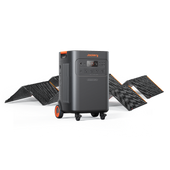












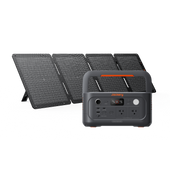



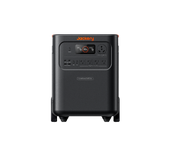
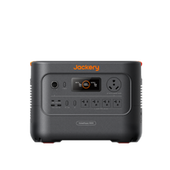






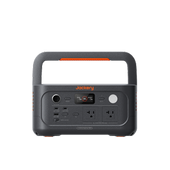





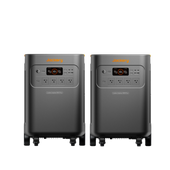
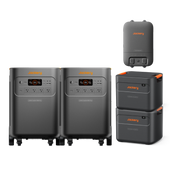





![[Add - on] Jackery Manual Transfer Switch for Explorer 5000 Plus - Jackery](http://www.jackery.com/cdn/shop/files/add-on-jackery-manual-transfer-switch-for-explorer-5000-plus-9017324.png?v=1754016782&width=170)

